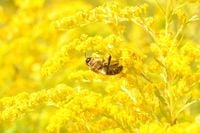April 28, 2025, marks Puda Day, a significant occasion in the Orthodox Church commemorating the apostles Aristarchus, Pud, and Trophimus. This day is steeped in tradition and folklore, particularly in Russia, where it has been celebrated for centuries.
As part of the observance, beekeepers across the country engage in the annual ritual of inspecting their beehives. They check on the health of the bees, ensuring they have survived the winter well. If spring has arrived early, and the first flowers bloom by the end of April, beekeepers will take the hives outdoors to enjoy the fresh air. This practice reflects the deep connection between the people and nature, as bees are revered as sacred creatures in many cultures.
Historically, bees were considered sacred insects, often referred to as God's favorite. It was believed that bees would only sting sinners, leading to various superstitions surrounding their behavior. For example, in ancient customs, a bride would test her suitor by standing under a tree where bees nested. If the bees ignored the groom, it was deemed a sign that the couple would have a successful marriage.
The day is also associated with the blooming of rowan and viburnum buds, which were traditionally used to create medicinal infusions. Our ancestors believed that these plants had healing properties; the buds were thought to help alleviate ailments, including toothaches. In fact, a common saying goes, "Rowan, rowan, heal my teeth, and if you don't, I will chew you all up." However, it was also believed that consuming rowan berries after this day could bring back tooth pain.
April 28 is often marked by various other traditions and omens. For instance, if the morning is clear but clouds appear by evening, it is said that a significant change in weather is on the horizon. Additionally, it is customary to change bed linens on this day. Those who sleep on clean sheets are believed to strengthen their relationships with family and meet interesting new people, paving the way for a series of pleasant events in their lives.
Moreover, many people take the opportunity to go for a walk in nature, whether by the river or in the forest. Such outings are thought to help clear the mind and inspire dreams about the future. Collecting medicinal herbs, bark, and roots is also a common practice on Puda Day, as people gather unblown buds from viburnum and rowan for future infusions.
Interestingly, there is a saying that the more sweets one consumes on Puda Day, the happier and more fulfilled their life will be in the coming year. This belief is closely linked to honey, a staple in many traditional celebrations.
However, Puda Day also comes with its share of warnings. It is advised not to lend money on this day, as the belief is that debts will not be repaid, leading to financial misfortune. Additionally, excessive work is discouraged; people are encouraged to take breaks to avoid attracting bad luck to themselves and their families. Working overtime is also frowned upon, as it is thought to invite greater misfortunes.
Another cautionary tale surrounds sharing personal secrets. On this day, it is advised against confiding in others, including close relatives, as it is believed that these secrets will become public knowledge. Furthermore, breaking rowan branches is said to result in toothaches, reinforcing the day's focus on health and well-being.
As Puda Day unfolds in 2025, it serves as a reminder of the rich tapestry of cultural traditions that connect people to their history and the natural world. The day encapsulates a blend of reverence for nature, community bonds, and the wisdom of generations past.
With its deep-rooted customs and beliefs, Puda Day not only honors the apostles of the Orthodox Church but also highlights the enduring significance of nature and community in the lives of those who celebrate it. As people engage in these time-honored practices, they continue to foster a sense of connection to their ancestors and the world around them, ensuring that the spirit of Puda Day remains vibrant and relevant for future generations.





